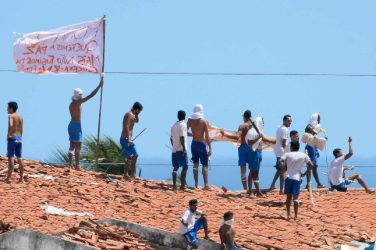As a boy growing up in Brazil’s impoverished northeastern state of Bahia, Brazilian actor Wagner Moura and star of television drug drama “Narcos”, saw slavery all around him but like many people he thought it was normal.
“I grew up witnessing a lot of people working in horrible conditions and not getting paid, working for food or a place to sleep. And I grew up thinking these kinds of things were normal,” Moura said.
“I remember girls, 11, 12-year-old girls, mostly black girls. They would spend their whole lives working in homes and some of them wouldn’t even go to school. So they were basically slaves.”
It was when Moura aged 17 went to Salvador, the capital of Bahia, that he realized what he had witnessed as a boy was wrong.
“It was a shock to me because I really believed that it kind of was what it was … it was then I realized people should get paid for their labor,” Moura said.
Brazil acknowledged the use of slave labor in its economy – Latin America’s largest economy – in 1995.
But more than two decades on, many people in Brazil, and across the world, still do not know slavery exists.
“I’ve been talking to people and they say they had no idea that this was happening. Slave labor – what are you talking about?,” said Moura, 41.
Globally there are 21 million people in forced labor, including children, in a business worth US$ 150 billion a year, according to the International Labor Organization (ILO).
In Brazil, forced labor is defined as a form of slavery. This includes degrading work conditions and long hours that pose a risk to a worker’s health and or life and debt bondage.
But activists fear a bill being debated by Brazilian lawmakers that seeks to limit the country’s broad definition of slave labor, including what constitutes degrading work conditions, could put more workers at risk of slavery.
“Changes to our definition of slave labor, I think it’s very possible for it to happen,” Moura said.
Worked To Death
As a goodwill ambassador on forced labor for the ILO, Moura earlier this year spoke to sugar cane workers who had been rescued from slave labor, including one who saw his friend die next to him in a field from exhaustion.
“He remembers the guy said to him. ‘I can’t see. I’m blind’. Then he goes to sit down and the guy just falls down dead,” Moura said. “He worked until he died. His body just couldn’t do it anymore.”
Moura believes tackling slavery is about promoting empathy between employers and their workers.
“When I talk to businessmen and politicians in my country, most of all I see a big lack of empathy with people. It’s all about profit.”
Brazil has been praised by the ILO and activists for making progress on tackling slavery in the past decade.
They highlight the government’s mobile units – made up of labor inspectors, prosecutors and police – who raid places where slave labor is suspected.
Since the initiative was launched in 1995, more than 50,000 workers, many on farms and cattle ranches, have been rescued from slavery-type conditions.
But there are fewer mobile units operating in Brazil today, and tackling slavery is less of a priority since conservative Michel Temer became president last year, activists say.
Dirty List
Moura said a key weapon in Brazil’s fight against slavery is the so-called “dirty list” of employers published by the labor ministry.
Launched in 2003, the blacklist has made public hundreds of companies and individual employers who were investigated by labor inspectors and found to be using slaves.
The dirty list was banned from being published following a nearly three-year legal dispute over its release but since March is has been published again.
“If we can make the dirty list more accessible I think it’s a powerful tool,” Moura said.
This article was produced by the Thomson Reuters Foundation. Visit them at http://www.thisisplace.org












